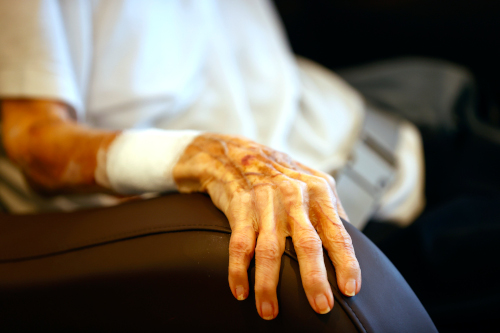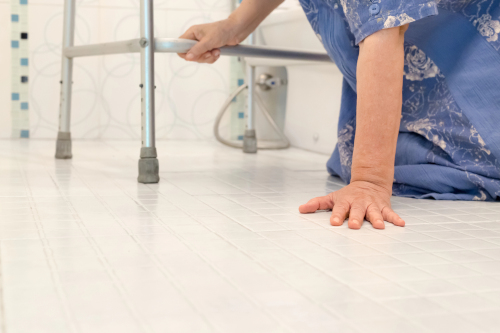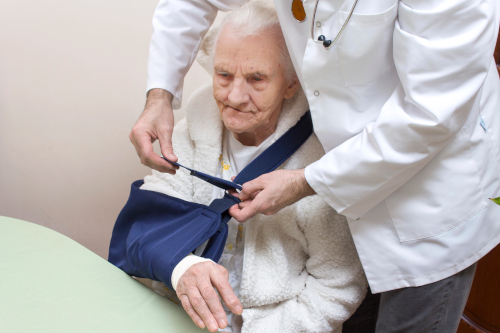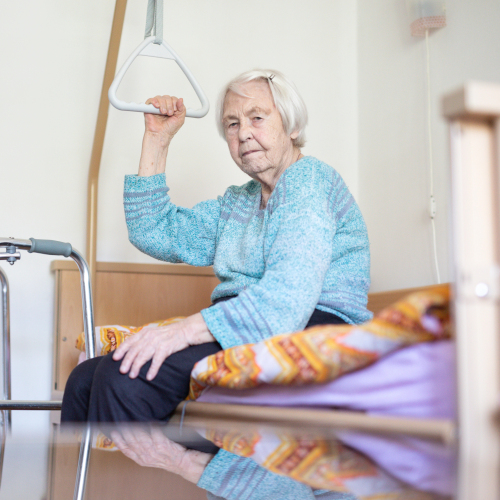The Nursing Home Law Center is committed to providing the legal resources necessary to hold negligent facilities accountable.
Nursing Home Injury Lawyer
Financial Compensation for Injuries Due to Elder Abuse and Neglect in Nursing Homes
When a loved one suffers harm in a long-term care facility, the impact can be devastating for the entire family. A nursing home injury lawyer can help you pursue justice and compensation when negligence, abuse, or neglect causes injuries to vulnerable residents.
Our firm is dedicated exclusively to protecting the rights of nursing home residents nationwide, and we have built a reputation for holding facilities accountable for failing to provide the care and dignity seniors deserve. With years of experience and proven results, Nursing Home Law Center is here to stand by your family and fight for the recovery your loved one needs.
Nursing Home Injury Settlements Recovered by Our Law Firm
$750,000 Settlement: An elderly resident suffered a broken leg due to a fall in a nursing home, leading to a significant settlement.
$1,700,000 Settlement: A nursing home fall resulted in a subdural hematoma and hip fracture for a resident, culminating in a substantial settlement.
$1,200,000 Settlement: A disabled woman sustained injuries in a nursing home van accident, leading to a significant settlement.
$12,800,000 Verdict: A nursing home abuse case involving untreated bed sores led to a patient’s death, resulting in a substantial verdict.
These settlements demonstrate the severe impact that common nursing home injuries can have on residents and their families. Understanding what constitutes a nursing home injury is the first step in recognizing, preventing, and addressing these incidents.
What Is a Nursing Home Injury?
Nursing home injuries can be physical, emotional, or psychological and negatively affect residents’ quality of life and safety while under the care of a nursing home. Nursing home employees, such as certified nursing assistants (CNAs), can be a source of emotional and psychological abuse, which can lead to anxiety and depression among residents.
These injuries can result from accidents, staff negligence, systemic failures, or intentional abuse. However, proper attention and care can likely prevent accidental injuries or those caused by environmental hazards.
The Role and Quality of Care Nursing Homes Should Provide
Every nursing home is responsible for providing residents with professional, compassionate, and comprehensive care. Any care provided is designed to maintain or improve the residents’ health, dignity, and overall quality of life. This can include:
- Proper medication management
- High-quality medical care
- 24-hour supervision and nursing care
- Social and recreational activities
- Nutritious meals and adequate hydration
- Clean and safe living conditions
- Assistance with activities of daily living (ADLs)
- Regular medical assessments
- Emergency response capabilities
Unfortunately, many facilities fall short and fail to prevent nursing home injuries.

What Causes Nursing Home Injuries?
Many nursing home abuse injuries result from avoidable factors within the control of nursing home staff or management. By recognizing these causes, you can better advocate for safer living conditions and quality care.
Negligence and Carelessness
Neglect is one of the leading causes of injuries in nursing homes. Failing to avoid physical harm and provide adequate care often includes:
- Failure to reposition immobile residents leading to pressure ulcers
- Inadequate monitoring of residents prone to falls
- Delays or errors in administering medications
- Ignoring signs of dehydration, malnutrition, or other medical needs
Staffing Shortages and Inadequate Training
Many nursing homes operate with fewer staff than required to provide proper care. Staff members may be overworked or lack the appropriate training to handle the specific needs of residents. Understaffing leads to:
- Delays in responding to calls for help
- Overlooking health issues or changes in a resident’s condition
- Improper use of restraints or rough handling
- Increased risk of medication errors
Poor Facility Maintenance and Safety Hazards
Unsafe living environments contribute significantly to injuries. A poorly maintained facility can create dangerous conditions that lead to serious harm. Common safety hazards include:
- Slippery floors, cluttered walkways, or uneven surfaces
- Broken or improperly adjusted bed heights
- Inadequate lighting in hallways or rooms
- Broken wheelchairs, lifts, or medical equipment
Intentional Abuse and Financial Exploitation
Unfortunately, some injuries result from deliberate abuse by staff or other individuals within the facility. Causes of intentional abuse include:
- Poor supervision of staff and other residents
- Lack of background checks on employees
- Failure to report or address previous incidents of abuse
Systemic Failures and Poor Management
Nursing home injuries often occur due to management-level failures, including a lack of proper policies, procedures, or oversight. Examples of systemic shortcomings include:
- Poor hiring practices and insufficient training
- Failure to implement fall prevention protocols
- Inadequate monitoring of food, water intake, and medical care
- Non-compliance with state and federal regulations
Addressing these root causes can help nursing homes take proactive steps to reduce the risk of injuries and create a safer environment for residents.

What Causes Nursing Home Injuries?
When you understand the various injuries a resident can suffer in a nursing home, such as spinal injuries, you’ll be better prepared to protect their rights with early intervention.
While nursing homes often have higher risks of severe injuries, an assisted living facility also presents its own set of injury risks, though they may differ in nature. Residents can suffer minor to serious injuries, all impacting their lives. Each injury needs attention and can seriously affect the residents’ physical and mental health.
Pressure Ulcers
Nursing homes are known for dealing with pressure ulcers and bedsores. These develop when a resident is left in the same position for too long without repositioning, which decreases blood flow. When facilities fail to provide proper wound care and neglect occurs, the results can include:
- Bone and joint infections
- Severe tissue damage
- Increased risk of death
- Sepsis in advanced cases
Bedsores can be prevented with regular repositioning, proper equipment, and proper nutrition. If a resident develops a bedsore, early intervention is key to protecting vulnerable residents and avoiding declining health status.
Falls
Falls are among the most common nursing home facility injuries and the most dangerous for older adults. When nursing home residents fall, it can result in specific issues, such as:
- Broken bones, especially a hip fracture
- Severe bruising and internal bleeding
- Head injuries and traumatic brain damage
- Increased fear and anxiety about moving
- Loss of mobility and independence
- Spinal injuries
If a resident falls, it can be for several reasons. Common risk factors for fall-related injuries in nursing homes are:
- Improper bed heights
- Mobility issues
- Muscle weakness
- Poor lighting or facility maintenance
- Inadequate supervision or assistance
- Slippery floors
- Balance problems
- Side effects from medications
Many nursing homes have fall prevention protocols to help reduce and prevent fall-related injuries. Even with these protocols, nursing facilities must be vigilant to keep walkways clear and monitor residents.
Medication Errors
Not everyone realizes that medication errors are considered injuries in nursing homes. Common issues include:
- Over-sedation
- Incorrect medication administration
- Missing criteria medications
- Harmful drug interactions
- Wrong dosage or timing
Medication injuries compromise the resident’s care and can lead to life-threatening conditions, emergency room visits, hospitalization, or sometimes death. Nursing homes must have proper medication management and documentation protocols to help prevent such mistakes.
Malnutrition and Dehydration
Everyone needs proper nutrition and hydration, and residents in a nursing home setting rely on staff to help them with this necessity. Nursing home injuries can happen due to malnutrition and dehydration, and cause other issues like:
- Weakness and fatigue
- Unexplained weight loss
- Dry skin and mucous membranes
- Delayed wound healing
- Confusion and disorientation
- Increased susceptibility to infections
Nursing homes must monitor food and water intake regularly, especially for residents who need assistance eating and drinking.
Physical and Emotional Abuse
Injuries from physical and emotional abuse are far too common in nursing homes. Forms of physical and emotional abuse are:
- Neglect of basic needs
- Hitting, rough handling, or pushing
- Isolation or social restriction
- Inappropriate use of restraints
- Verbal threats and intimidation
- Humiliation or degrading treatment
The impacts of nursing home abuse extend far past the physical injuries. These can lead to lasting psychological trauma, impeding the resident’s ability to focus on maintaining or improving their health status.
Sexual Abuse
Sexual abuse in nursing homes is alarming and often goes unreported or unnoticed. This type of abuse can take many forms, including:
- Sexual harassment
- Forced nudity
- Sexual assault or rape
- Unwanted fondling or touching
- Taking explicit pictures of residents
Every resident is vulnerable to sexual abuse, particularly those with cognitive impairments, as it’s easier for abusers to manipulate them. Nursing home staff must have robust prevention protocols and reporting procedures.
What Are the Most Common Signs of Nursing Home Abuse and Neglect?
Not all abuse has physical signs you’ll see immediately. Family members play a crucial role in identifying and addressing signs of abuse in nursing homes. Knowing what to look for in nursing home settings is essential for anyone who has a family member or loved one in a nursing home. Most families should pay close attention to the following.
Physical Signs
Spotting physical injuries in nursing homes tends to be the easiest. Knowing the signs of elder abuse can help you ensure you’re making sure your loved one is being taken care of:
- Pressure ulcers
- Sudden head injury
- Unexplained bruises, burns, or cuts
- Unusual weight loss
- Broken bones, severe fractures, or sprains
- Dehydration and malnutrition symptoms
- Bruising around wrists and ankles suggests improper use of physical restraints
- Poor hygiene
- Other signs and unexplained injuries and medical conditions
Severe cases can result in serious injuries and even death. File a police report if your loved one is injured and needs immediate medical attention. Many residents are scared to report staff, such as registered nurses, for abuse because they fear adverse consequences.

Emotional Signs
Being in a nursing home can significantly affect a resident’s behavior. While that’s common, be on the lookout for sudden and prolonged signs of emotional neglect that are not age-related changes, like:
- Mood swings
- Sudden depression and anxiety
- Unusual fearfulness, especially around certain staff members
- Loss of interest in hobbies or social interaction
- Signs of Post-Traumatic Stress Disorder (PTSD)
Behavioral Signs
When a nursing home resident has sudden behavioral changes, it can indicate a more significant problem. Behavioral changes that might indicate nursing home abuse or neglect include:
- Rocking or other self-soothing behaviors
- Aggression or agitation
- Regression in physical and mental abilities
- Reluctance to speak openly, especially around certain nursing home staff members
- Unusual sexual behavior
- Changes in sleeping patterns, like insomnia or nightmares
Weight Loss or Malnutrition
Even if a resident chooses not to eat, it’s the nursing home’s responsibility to ensure that they’re getting proper nutrition and hydration. Signs that your loved one is suffering from malnutrition include:
- Frequent illness
- Sudden or drastic weight loss
- Weakness and lethargy
- Sunken cheeks and eyes
- Dental problems
- Clothes are too loose
If you suspect abuse, it is crucial to intervene quickly and document the incident.
How to Report Nursing Home Abuse on Behalf of a Family Member
If you suspect nursing home abuse, take immediate action using these key steps:
- Contact the Facility Administrator: Report the abuse to the nursing home’s management so they can intervene immediately.
- Reach out to the Long-Term Care Ombudsman Program: Ombudsmen advocate for nursing home residents and can help address complaints. For assistance, visit the National Long-Term Care Ombudsman Resource Center or call 1-800-677-1116.
- File a Complaint with Your State’s Health Department: Each state’s health department investigates complaints about nursing home violations. Find state-specific contact information through the Centers for Medicare & Medicaid Services (CMS).
- Report to Adult Protective Services (APS): APS investigates abuse and neglect cases. To locate your local APS, call the Eldercare Locator at 1-800-677-1116.
- Contact the National Center on Elder Abuse (NCEA): For general guidance and resources on reporting abuse, visit ncea.acl.gov or call 1-855-500-353

State and Federal Laws Protecting Nursing Home Residents
Federal and state laws protect nursing home residents’ rights to quality care, dignity, and freedom from abuse. These legal frameworks mandate that facilities uphold specific standards to promote their well-being.
Right to Quality Care
Under 42 CFR § 483.10 of the Federal Nursing Home Reform Act, residents are entitled to:
- Proper medication management
- Regular medical assessments
- Appropriate medical care
- Individualized care plans
- Adequate supervision
- Professional and competent care
- Adequate staffing levels
- A clean and safe living environment free from safety concerns
These provisions ensure that nursing homes deliver services that meet professional standards and cater to the individual needs of each resident.
Right to Dignity and Respect
The same federal regulation, 42 CFR § 483.10, guarantees residents the right to dignity and respect, which includes:
- Participation in care decisions (if cognitively able)
- Privacy during personal care
- Consideration of cultural and religious preferences
- Respect for personal preferences
- Maintenance of personal relationships
- Freedom to make their own medical and personal choices
These rights empower residents to maintain autonomy and personal identity within the nursing home sight to Be Free From Abuse and Neglect
Federal law explicitly protects residents from abuse and neglect. According to 42 CFR § 483.12, nursing homes must ensure that residents are free from:
- Physical abuse and improper use of restraints
- Emotional and psychological abuse
- Sexual assault and abuse
- Discrimination
- Neglect of basic needs
- Financial exploitation
- Retaliation for complaints
Facilities must implement policies and procedures to prevent abuse, investigate allegations, and report incidents to appropriate authorities.
State-Specific Protections
In addition to federal regulations, states have laws safeguarding senior citizens in nursing homes. In Illinois, for example, elderly persons are protected under the Illinois Nursing Home Care Act (210 ILCS 45), which ensures their rights to quality care, dignity, and freedom from abuse.
Tennessee Code Title 68, Chapter 11, Part 9 outlines residents’ rights in Tennessee. The specifics vary by state, but most states have additional laws to protect elderly patients in assisted living and nursing facilities.

The Role of a Nursing Home Abuse Lawyer
Nursing home abuse attorneys are invaluable in nursing home litigation in injury cases.
How Long Do You Have to File A Claim?
The statutes of limitations to file a nursing home injury claim vary by state. In some states, you only have one year to take legal action, so it’s essential to speak with a nursing home abuse lawyer immediately to ensure you don’t miss the deadline.
Investigating the Incident
An experienced elder or nursing home abuse lawyer provides invaluable legal help in building your case. They’ll thoroughly investigate the situation, including:
- Identify regulatory violations
- Gather and analyze medical records, including medical expenses
- Consult with medical experts to support your claims
- Interview staff, other residents, and any potential witnesses
- Review facility procedures and policies
- Document evidence of abuse or negligence
Building a Strong Case
Based on what you’ve told them and the findings of their investigation, your attorney will then build a compelling case for you or your loved one. Building a solid case involves:
- Establishing the standard of care
- Demonstrating how the nursing home didn’t meet that standard of care
- Documenting all damage and injuries incurred
- Securing expert testimony
- Identifying all the liable parties (staff members, administration, the nursing home, etc.)
- Preparing all the evidence for the presentation
Negotiating With Insurance Companies
When you file a personal injury claim for nursing home abuse or neglect, dealing with insurance companies can bring a lot of stress. Experienced personal injury lawyers will negotiate with the insurance companies on your behalf because they understand:
- Insurance company’s tactics to reduce payouts
- Settlement negotiation strategies to ensure maximum compensation for damages, including medical bills, mental anguish, emotional distress, and other damages
- Fair compensation values based on the specific injuries incurred
- Timeline management
- Protection of client’s interests and rights
- Documentation requirements
Litigating the Case
Ideally, your lawyer and the liable parties can settle your claim out of court. If necessary, your lawyer will handle the litigation of your case. This includes:
- Filing necessary legal documentation
- Representing you in court proceedings
- Cross-examining witnesses
- Presenting evidence effectively
- Arguing your care in front of a judge and jury
- Protecting your legal rights and interests throughout the entire process
What is the Average Payout for Injuries Due to Nursing Home Abuse or Neglect?
According to Law.com’s VerdictSearch, payouts in nursing home abuse and neglect cases range from $10,000 to $160,050,000. The average payout is $4,513,471, while the median recovery is $825,000.
Several factors can influence the value of a nursing home abuse lawsuit, including:
- Severity and type of injury suffered (e.g., fractures, pressure ulcers, sepsis, wrongful death)
- Whether the abuse was physical, emotional, sexual, or involved gross neglect
- Duration of the mistreatment and whether it led to long-term disability or death
- Evidence of understaffing, poor training, or systemic failures at the facility
- Quality of documentation, medical records, and incident reporting
- Strength of expert testimony and consistency with care standards
- Whether punitive damages are pursued for reckless or willful misconduct
- Facility’s history of violations, citations, or prior lawsuits
Example Cases
$114,000,000 Verdict – Neglect, Bedsores, and Malnutrition Lead to Death
Juanita Jackson, 76, was admitted for short-term rehabilitation but suffered a fall, head trauma, fractured arm, severe bedsores, and malnutrition due to alleged understaffing and poor care. Her family claimed she was left immobile, overmedicated, and deprived of basic needs, which caused her health to deteriorate until her death.
The jury found the defendants equally liable and awarded $114 million, including $100 million in punitive damages and $9 million for wrongful death and loss of parental guidance.
$54,000,000 Verdict – Fatal Bleeding due to Nursing Home Neglect
Barbara Barber, 78, died from gastrointestinal bleeding while under care for multiple chronic conditions. Her daughter claimed the nursing facility failed to recognize and treat the bleeding, leading to her death.
The defense argued she died from a heart attack and that the care provided met professional standards. The jury sided with the plaintiff and awarded $54 million, including $50 million in punitive damages and $4 million in compensatory damages to her estate.
Book a Free Consultation and Secure the Legal Representation Your Family Deserves!
Nursing homes and staff are responsible for caring for all residents, including finding ways to prevent nursing home injuries. While some injuries are accidental, proper patient safety protocols can stop them.
If you or a loved one has suffered an injury while at a nursing home, you’re not alone. Whether it was a minor or serious injury, our nursing home abuse attorneys are here to help you hold the party accountable.
Our legal team understands what common injuries are in nursing homes and how to protect the rights of injured residents during their stay. Don’t let nursing home negligence get brushed under the rug.
Contact us today for a free case review by filling out our online form or calling (800)-926-7565.

